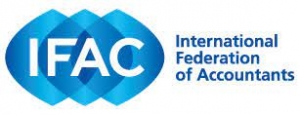عرض العناصر حسب علامة : الاقتصاد
الاتحاد الدولي للمحاسبين يدعو قادة مجموعة العشرين للتعاون لحل القضايا الملحة طويلة الأجل
معايير الإبلاغ المتعلقة بالاستدامة، وإدارة المالية العامة، ومكافحة الفساد، والتعاون كلها عوامل ضرورية لتحقيق أهداف التنمية المستدامة.
الاتحاد الدولي للمحاسبين يزيد من التزام مهنة المحاسبة بمكافحة الفساد والجرائم الاقتصادية
أصدر الاتحاد الدولي للمحاسبين خطة عمل تهدف إلى تعزيز مساهمة مهنة المحاسبة ودعمها لنظام بيئي قوي لمكافحة الفساد يضم مجموعة متنوعة من المشاركين ومن السياسات.
"أبوغزاله العالمية" تفوز بجائزة الاتحاد الدولي للمصارف العربية في "التميز في دعم التحول الرقمي في الوطن العربي"
فازت مجموعة طلال أبوغزاله العالمية بجائزة التميز في دعم التحول الرقمي في الوطن العربي والتي يمنحها الاتحاد الدولي للمصارف العربية.
رسالة دكتوراه: أثر تغيرات أسعار الصرف على مستوى معيشة الأسرة المصرية
تهدف هذه الدراسة إلى تحليل أثر تغيرات أسعار الصرف على مستوى معيشة الأسرة المصرية في الفترة من 1991م، والتي تمثل البداية الفعلية لبرامج الإصلاح الاقتصادي.
رسالة دكتوراه: البيئة المؤسسية المصرية ودورها في جذب الاستثمارات المحلية والأجنبية
يتطلب تحقيق التنمية الشاملة لأي اقتصاد معاصر توافر البيئة المؤسسية المدعمة للأهداف الإتمانية والتنموية التي ينبغي تحقيقها في الأجل القصير والمتوسط والطويل .وعلى المستوي العملي يأتي توفير البيئة المؤسسية من أهم العناصر الضرورية لتحقيق التنمية الشاملة.
قطر تستضيف المؤتمر الدولي لوكالات التصنيف العالمية في يناير المقبل
تستضيف دولة قطر، المؤتمر الدولي لوكالات التصنيف في 23 يناير المقبل، بشراكة استراتيجية بين جمعية المحاسبين القانونيين القطرية ومعهد الامتثال العالمي GCI.
رسالة دكتوراه: مكافحة التجنب الضريبي الدولي في ضوء أنشطة الاقتصاد الرقمي هل هو ضرورة أم رفاهية
تعرض الورقة لطبيعة أنشطة الإقتصاد الرقمي وما تفرضه من تحديات أمام النظم الضريبية القائمة، وبناء عليه تم تقييم المعاملة الضريبية لأنشطة الاقتصاد الرقمي في كل من قانوني 91 لسنة 2005 وتعديلاته وقانون 67 لسنة 2016.
رسالة ماجستير: إدارة الجودة الشاملة
يحظى موضوع الجودة بالأولوية في اهتمام الفكر الإداري، والمنظمات المختلفة بهدف الإنتاجية، بعد أن اتضح أنها العامل الرئيسي في نجاح المنظمة، وكان نجاح اليابان خلال العقود الثلاث الأخيرة من القرن الماضي، نموذجاً لسعى المنظمات للاهتمام بالجودة
رسالة ماجستير: مدى استقلال الشركة التابعة عن الشركة القابضة
تعد ظاهرة الشركة القابضة من أهم الظواهر الاقتصادية العالمية، لما لها من تأثيرات مهمة على الاقتصاد القومي والدولي على حد سواء، بل إن أهمية هذه الظاهرة تتجاوز حدود المجال الاقتصادي إلى التأثير العميق في المجالات السياسية والاجتماعية، لقدرة هذه الشركات على تركيز رؤوس الأموال، والقيام بأعباء المشاريع الاقتصادية الضخمة التي تعجز بعض الدول عن القيام بها.
رسائل ماجستير: التدقيق البنكي في المؤسسات المصرفية
تسعى الأنظمة العالمية دائماً إلى اتخاذ التدابير الكفيلة بتوفير أحسن الشروط المنسابة والملائمة لنمو الاقتصاد على وجه العموم، والجانب المالي والمصرفي على الخصوص، إذ أصبح هذا الأخير يمثل الجزء الأعظم والركيزة الأساسية لهذه الأنظمة لما تحتله من مكانة خاصة وأنها تساهم في عملية استثمار المشاريع الكبرى.










